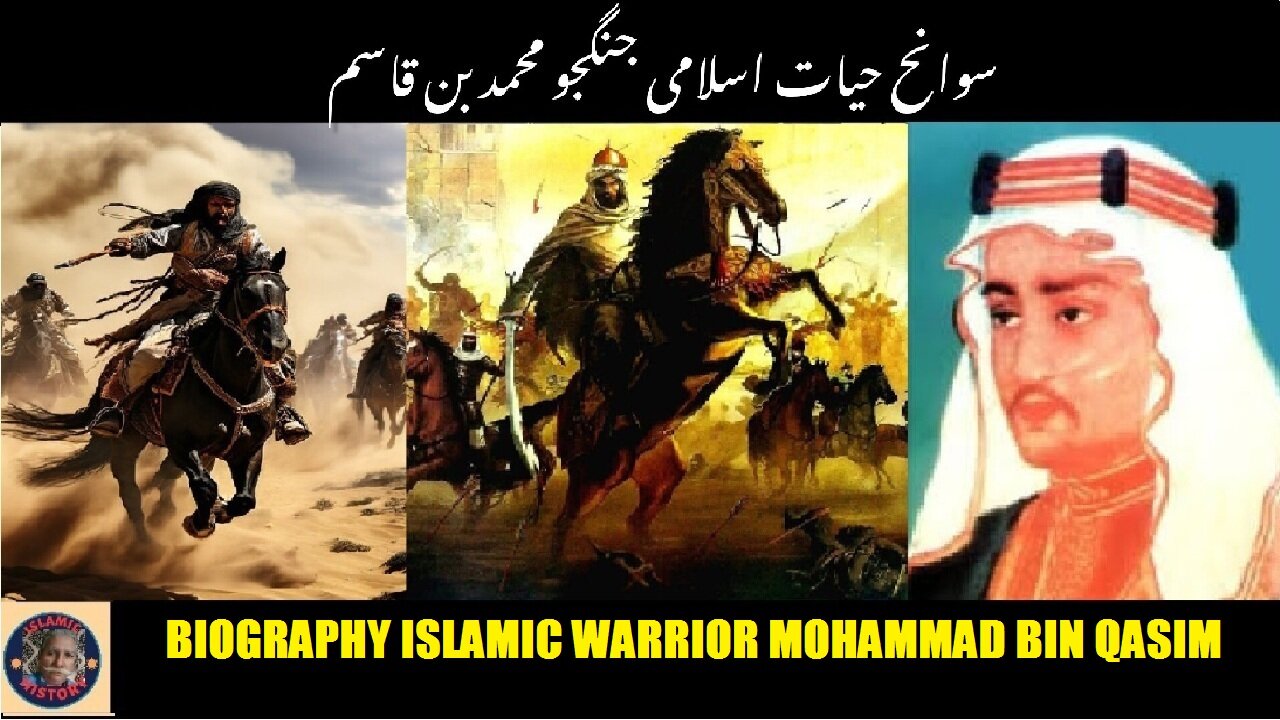Premium Only Content

Biography of Muhammad ibn al-Qasim al-Thaqafi | سوانح حیات محمد بن القاسم
@islamichistory813 #HistoricalFigures #IslamicWarrior #CulturalImpact
Biography of Islamic warrior Muhammad ibn al-Qasim al-Thaqafi
Dekhti Aankhooon aur sountay kaanoon ko Asslamoalaikum, sisters, brothers friends and elders, Today In this islamic warrior leaders informative videos, we present the biography of Muhammad ibn al-Qasim al-Thaqafi, a prominent Islamic warrior whose military prowess and strategic acumen significantly shaped the spread of Islam in South Asia. Through a detailed examination of his life, including his key battles and leadership qualities, we aim to highlight the importance of his contributions to Islamic heritage. We are describing the story of a warrior whose influence resonates to this day.
Muhammad ibn al-Qasim al-Thaqafi was an Arab military commander in service of the Umayyad Caliphate who led the Muslim conquest of Sindh (and Punjab, part of ancient Sindh), inaugurating the Umayyad campaigns in India. His military exploits led to the establishment of the Islamic province of Sindh, and the takeover of the region from the Sindhi Brahman dynasty and its ruler, Raja Dahir, who was subsequently decapitated with his head sent to al-Hajjaj ibn Yusuf in Basra. With the capture of the then-capital of Aror by Arab forces, Muhammad ibn al-Qasim became the first Muslim to have successfully captured Indian land, which marked the beginning of Muslim rule in South Asia.
Muhammad ibn al-Qasim belonged to the Banu Thaqif, an Arab tribe that is concentrated around the city of Taif in western Arabia. After the Muslim conquest of Persia, he was assigned as the governor of Fars, likely succeeding his uncle Muhammad ibn Yusuf al-Thaqafi. From 708 to 711, Muhammad ibn al-Qasim led the Sindh conquest. He established Islamic rule throughout the region, serving as governor of Sindh from 712 until his death in 715. After his last conquest of Multan (Punjab) he returned to Arabia where on the way he died in Mosul, in modern Iraq, though some sources[who?] record that his body was buried in Makran, a semi-desert coastal region in Balochistan.[citation needed]
Sources
Information about Muhammad ibn al-Qasim and the Arab conquest of Sind in the medieval Arabic sources is limited, compared to the contemporary Muslim conquest of Transoxiana. The Futuh al-Buldan ('Conquests of the Lands') by al-Baladhuri (d. 892) contains a few pages on the conquest of Sind and Muhammad's person, while biographical information is limited to a passage in a work by al-Ya'qubi (d. 898), a few lines in the history of al-Tabari (d. 839) and scant mention in the Kitab al-Aghani (Book of songs) of Abu al-Faraj al-Isfahani. A detailed account of Muhammad's conquest of Sind and his death is found in the Chach Nama, a 13th-century Persian text. The information in the Chach Nama purportedly derives from accounts by the descendants of the Arab soldiers of the 8th-century conquest, namely qadis (judges) and imams from the Sindi cities of Alor and Bhakar who claimed descent from Muhammad's tribe, the Banu Thaqif. The Orientalist Francesco Gabrieli holds the accounts likely emerged after c.?1000 and considers the Chach Nama to be a "historical romance" and "a late and doubtful source" for information about Muhammad.
Muhammad was born in c.?694. His birthplace was almost certainly in the Hejaz (western Arabia), either in Ta'if, the traditional home of his Thaqif tribe, or in Mecca or Medina. Following their general embrace of Islam in c.?630, members of the Thaqif gradually attained high military and administrative ranks in the nascent Caliphate and played important command and economic roles during and after the early Muslim conquests, particularly in Iraq. The tribe produced effective commanders associated with early Arab military operations against the Indian subcontinent: in c.?636 the Thaqafite governor of Bahrayn (eastern Arabia), Uthman ibn Abi al-As, dispatched naval expeditions against the Indian ports of Debal, Thane and Bharuch. The tribe's power continued to increase with the advent of the Umayyad Caliphate in 661.
Muhammad belonged to the Abu Aqil family of the Banu Awf, one of the two principal branches of the Thaqif. The Abu Aqil family gained prestige with the rise of al-Hajjaj ibn Yusuf, the paternal first cousin of Muhammad's father al-Qasim ibn Muhammad ibn al-Hakam. Al-Hajjaj was made a commander by the Umayyad caliph Abd al-Malik during the Second Muslim Civil War and killed the Umayyads' chief rival for the caliphate, Abd Allah ibn al-Zubayr, in 692, and two years later was appointed the viceroy of Iraq and the eastern Caliphate. Following his promotion, al-Hajjaj became a patron of the Thaqif and appointed several members to important posts in Iraq and its dependencies. Muhammad's father was appointed the deputy governor of Basra, though his career was otherwise undistinguished. According to a letter between Muhammad and al-Hajjaj cited by the Chach Nama, Muhammad's mother was a certain Habibat al-Uzma (Habiba the Great). The Chach Nama also indicates Muhammad had a similar-aged brother named Sulb and Arabic sources indicate he had a much younger brother named al-Hajjaj, who served as an Umayyad commander during the Alid revolt of 740.
No information is provided by the Arabic sources about Muhammad's childhood and adolescence. The modern historian Nabi Bakhsh Baloch holds that Muhammad most likely grew up partly in Ta'if and then Basra and Wasit, the provincial capital of Iraq founded by al-Hajjaj in 702. Muhammad's time in Basra, a military and intellectual centre of the Islamic world at the time, may have widened Muhammad's career horizons, while at Wasit he was likely educated and trained under al-Hajjaj's patronage.
Al-Hajjaj was highly fond of Muhammad, and considered him prestigious enough to marry his sister Zaynab,[11] though she preferred the older Thaqafite al-Hakam ibn Ayyub ibn al-Hakam, to whom she was ultimately wed. The Kitab al-aghani refers to Muhammad at the age of 17 as "the noblest Thaqafite of his time". In the summation of Baloch, "Muhammad grew up under favourable conditions into an able, energetic and cultured lad of fine tastes".
So sisters brothers friends and elders, tomorow we will be describing Muhammad ibn al-Qasim al-Thaqafi as a Governor of Fars . Allah Hafiz
=============================================
-
 7:07
7:07
ISLAMIC HISTORY
1 day agoBiography of Islamic Scholar Al Tamimi اسلامی اسکالر التمیمی کی سوانح عمری۔
5 -
 LIVE
LIVE
LFA TV
12 hours agoLIVE & BREAKING NEWS! | WEDNESDAY 10/15/25
2,844 watching -
 15:23
15:23
Producer Michael
21 hours agoINSIDE AL CAPONE'S BULLETPROOF 1928 CADILLAC
32.3K5 -
 11:06
11:06
Scammer Payback
18 hours agoScammer Fails Tech Test...Gets His Computer Absolutely Destroyed
16.9K1 -
 8:45
8:45
Millionaire Mentor
19 hours agoDevin Nunes SHOCKED Everyone After EXPOSING The Deep State’s Dirty Secret
20.5K7 -
 2:01:40
2:01:40
BEK TV
1 day agoTrent Loos in the Morning - 10/15/2025
19.1K1 -
 2:53
2:53
OfficialJadenWilliams
17 hours agoWhen GTA 6 is TOO detailed...
21.6K2 -
 LIVE
LIVE
FyrBorne
12 hours ago🔴Battlefield 6 Live M&K Gameplay: Finding The Real GOATs of Battlefield 6
104 watching -
 50:14
50:14
Coin Stories with Natalie Brunell
1 day agoUptober, Q4, and Bitcoin’s Next Leg with Mark Moss
88.8K16 -
 LIVE
LIVE
Lofi Girl
2 years agoSynthwave Radio 🌌 - beats to chill/game to
133 watching